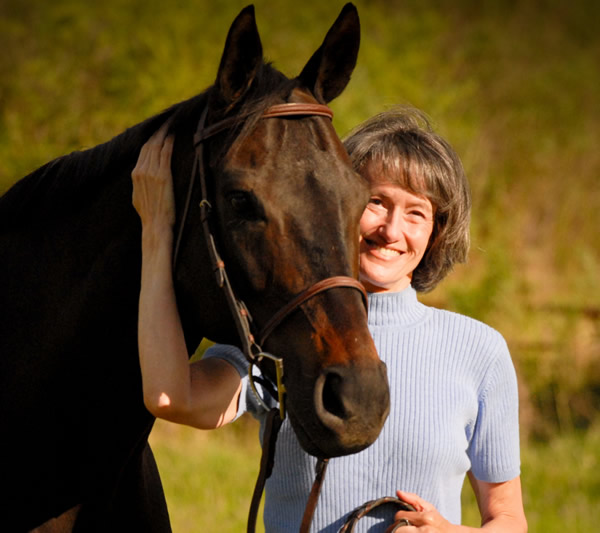TRUE TRAINING 20 - Working the Whoa
On with the Discovery Test in the round pen… My second round pen peeve is the whoa. Here, True fails my test. Some youngsters have been taught to “trot” and “canter” from the ground, using voice commands. But very few understand the command to “walk,” and even fewer know the word “whoa.” This is a human problem, not a horse problem—most people working with horses don’t use “whoa” properly.
So, allow me a moment on my soapbox: “Whoa” means dead stop right now with all four feet rooted to the ground. The feet do not move. At. All. The handler can walk toward or away from the horse, or all around him either close up or far away, and still the feet do not move. “Whoa” does not mean “slow down” or “calm down.” We use terms like “slower,” “faster,” or “easy” for that.
To teach the “whoa,” I begin by rewarding the cues and commands that True knows. He knows that when I lift the longe whip and position my body on an angle behind his, he needs to move forward. I reward him for this response with my voice—low, slow, calm, “good boy.” Soon, it’s pretty easy to encourage him forward into a trot, at which point I begin teaching him the word “trot.” Soon by using my voice as reward, I can simply say “trot” without lifting the whip or angling myself behind him, and off he goes at a medium trot.
True shows me in his Discovery Test that he has been taught to work for a while, then drop to a walk and head for the center of the round pen to greet the handler. I don’t want that! I want him to learn to listen to me, to wait for my command, and to follow it exactly. When the time comes to transfer his round penning to a longe line, I don’t want him approaching me on a longe line, getting tangled in the line while marching toward me in the center. So I begin to teach the command “walk.” He is befuddled by this. Say what??
We work awhile on “walk,” with me slowing him from a trot with my voice (low, slow, “walk” repeatedly). I reward with my voice (“gooood,”, “good boy, True”) when he walks in a circle on the outer edge of the round pen. I flick the whip at him gently when he tries to come in toward me, and remind him to “walk.” Most horses pick this up quickly, and True is no exception.
This leaves “whoa.” After 6 or 8 sessions, most relaxed youngsters learn “walk,” “trot,” and “canter” pretty reliably. Only then do I teach the “whoa.” Horse brains need to concentrate on learning one thing at a time. (You might have noticed that human brains work best when focused, too. But for the horse, it’s especially important.)
At first, “whoa” has no effect because it means nothing to my little Trouper. I bring him to a walk, drop the whip gently, look down at my feet (while preserving a tiny view of his hooves from under my hat), and say “whoa.” In the first few lessons, I have to say the word many times. Sometimes I have to squat down in the center of the round pen, making myself small.
One of two things happens: either the horse eventually gets tired of walking and just stops, at which point I give him an edible reward, lots of praise and strokes, and end the session immediately. Or the horse walks for 15 minutes, ignoring the word “whoa,” and I have to step slightly in front and closer to him to get him to stop. At which point, again, I give him an edible reward, lots of praise and strokes, and end the session immediately. Either option is a win.
You can help the learning process by saying “whoa” in connection with a natural slowing action action right from the start. So, if the horse begins to slow his walk, I say “whoa” several times in hopes that he will stop while I am using that word. Likewise, if I have to step in front of the horse to stop him, I say “whoa” while doing that. Horse brains connect a reward to the most recent action that occurred. Work that brain timing in your favor! Over time, the horse will learn to stop at the voice command alone.
The horse’s brain learns best by reward, not pressure. He might need his lesson often before he stops every time you say “whoa.” But when he does, you will have an animal who listens to you. He can now be told to stop when you are in danger of losing your seat, when he is in danger of an approaching object, when you need to groom or clip a wiggler, or when he won’t stand for the farrier or veterinarian. In short, “whoa” is a fine skill to have!

